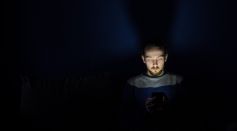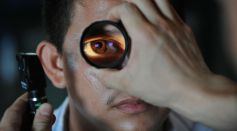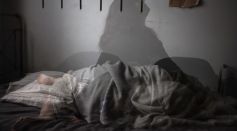Tags: Circadian rhythm

Taylor Swift's 'Jet Lag is a Choice' Remark After Super Bowl Debunked by Sleep Expert: How to Reduce Symptoms
Infant Gut Microbe Found To Have Their Own Circadian Rhythm; Diet Has Little Impact on How They Assemble
Do Plants Sleep? How Do They Know When It’s Time to Take a Rest?

Baby Sleep: How Much Sleep Does a Newborn Need?

Early Birds Tend To Earn More Than Night Owls: Study Links Circadian Rhythm to Income
Oyster Insomnia Results From Light Pollution As the Artificial Illumination Disrupts the Bivalve’s Circadian Rhythm

Always Feeling Tired Even With Enough Sleep? Here Are 10 Reasons Why the Body May Not Be In Sync With Its Circadian Rhythm
Blind Fish Retain Light-Sensing Abilities in Mexican Cave System, Challenging Circadian Rhythm Understanding

Intermittent Fasting Makes You Live Longer? Here's How Time-restricted Diet Influences Gene Expression With Numerous Potential Health Benefits

NIH's $1.91M Grant Aims To Explore Role of Circadian Rhythm in Tissue Repair

Mind After Midnight Hypothesis: Staying Awake Late at Night or Past Circadian Rhythm Causes Adverse Changes in the Brain

Eye Health, Circadian Rhythm and Diet Are Associated With One's Maximum Lifespan, Research Study Says

Sleep Disruption: Stop These Morning Habits That Keep You From Enjoying a Nighttime Slumber

Time To Ditch The Nightlights: Study Says Sleep-Promoting Hormone Melatonin Plummets Before Bedtime At the Slightest Exposure to Light

Morning vs Evening Exercise: Experts Analyze the Difference in Effects on the Body

When is The Best Time to Sleep? Study Recommends Bedtime to Lower Risk of Heart Disease

Health Benefits of Spending More Time Outdoors; Research Reveals Daily Fix of Sunshine Enhances Mood, Sleep, Lowers Depression Risk

Circadian Rhythm Might Be Worsening Your Asthma at Night, Research Suggests

How To Sleep Better: Neuropsychologist Shares Tips on Snoozing Back After Waking up at 3 Am

Technology, Gadgets Use May Change Human Body Clock; Here's What to Do
Most Popular

Ancient Hotspot Found to Have Created Great Lakes 300 Million Years Ago

Mysterious Structures Discovered Beneath the Pacific Ocean, Puzzle Scientists

Health Benefits of Drinking Hot Chocolate

Largest Known Volcanic Aquifer Discovered Beneath Oregon's Cascades





